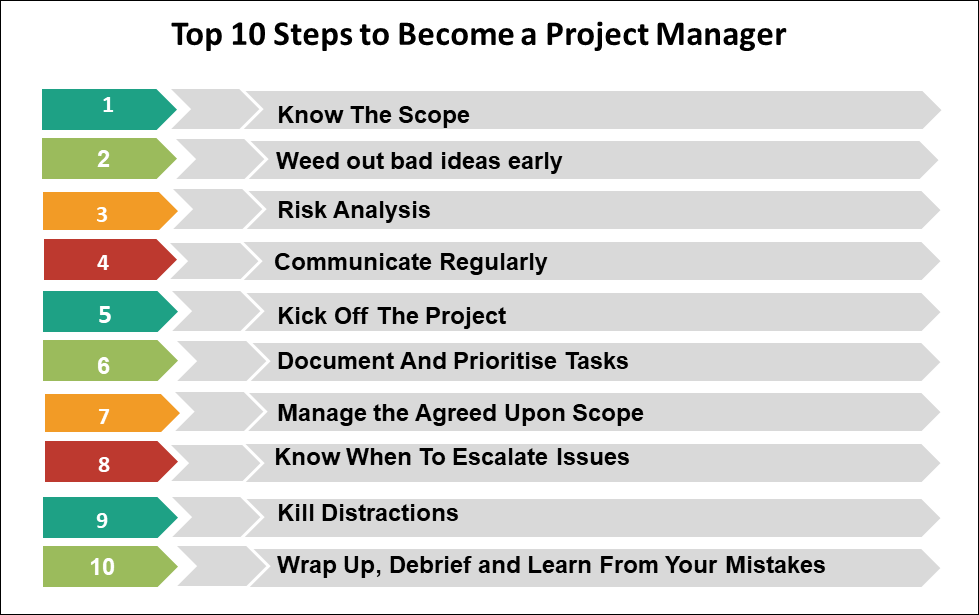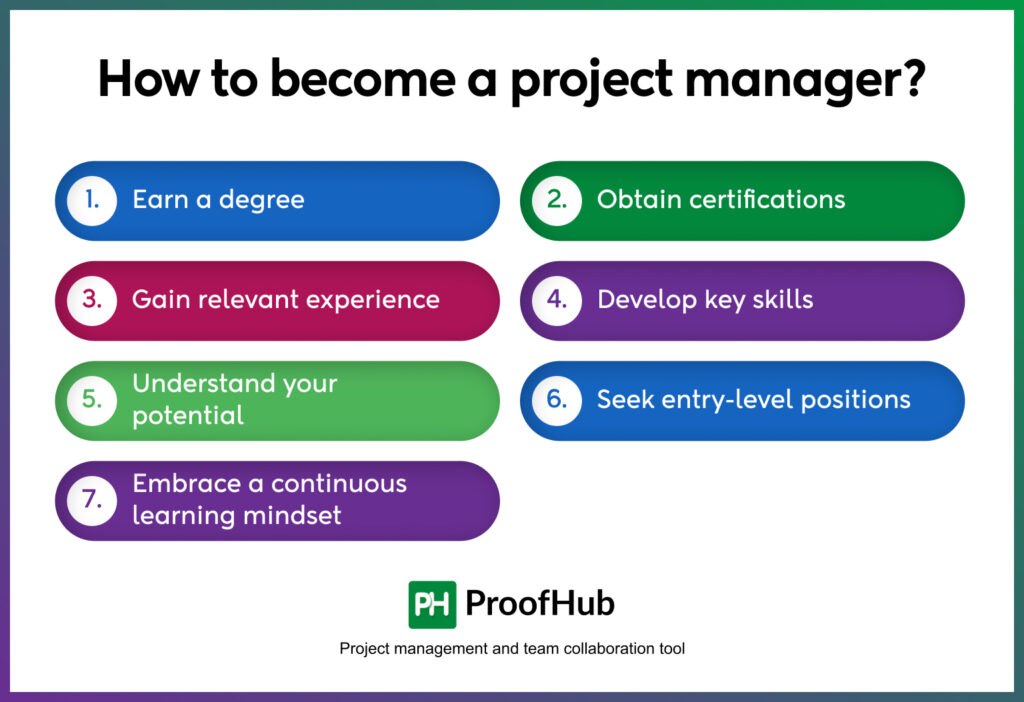Are you looking to kickstart a career as a project manager? You’re in the right place.
Whether you’re eyeing a role in tech, construction, or any other industry, project management skills are in high demand. Imagine leading projects, coordinating teams, and seeing your ideas come to life. Sounds exciting, right? But how do you get there?
We’ll break down each step you need to take to become a successful project manager. From gaining essential skills to securing your first role, we’ve got you covered. Stay with us, and you’ll discover how to turn your aspirations into reality. Ready to dive in? Let’s explore the step-by-step path to your new career.

Credit: freelanceprojectmanager.be
Understanding The Role
Project managers lead teams to achieve specific goals. They ensure projects run smoothly. This requires planning, execution, and monitoring. Understanding the role is crucial to success. It involves managing resources, budgets, and timelines.
Project managers communicate with team members and stakeholders. They solve problems and make decisions. Knowing the role helps in developing necessary skills.
Key Responsibilities
Project managers define project scope and objectives. They plan tasks and assign roles. Monitoring progress and performance is essential. Adjusting plans when needed is part of the job. Reporting to stakeholders is crucial. Ensuring quality and meeting deadlines is a priority.
Essential Skills
Project managers need strong communication skills. They must be good at problem-solving. Leadership skills are vital for team motivation. Time management is crucial to meet deadlines. They should be skilled in negotiation and conflict resolution. Organizational skills help keep projects on track.
Industry Variations
Project management varies across industries. In construction, safety is a key focus. In software, adaptability is important. Healthcare projects require regulatory knowledge. Each industry has specific challenges. Understanding these helps tailor approaches.
Educational Pathways
Becoming a project manager requires a solid educational foundation. This path is diverse, offering multiple routes to gain the necessary skills. Whether through degrees, certifications, or online platforms, each option provides unique benefits. Let’s explore these pathways to help you make an informed decision.
Relevant Degrees
A degree in business management is a common choice. It covers essential areas like leadership and strategic planning. Another option is a degree in project management itself. This focuses specifically on methodologies and tools used in the field. Engineering or IT degrees are also valuable. They offer technical insights useful for specific project types.
Certification Options
Certifications enhance credibility. The Project Management Professional (PMP) certification is widely recognized. It validates your skills and experience. Certified Associate in Project Management (CAPM) is suitable for newcomers. It provides foundational knowledge and boosts career prospects. Agile certifications are valuable too. They focus on flexible project management techniques.
Online Learning Platforms
Online platforms offer accessible learning. Websites like Coursera and Udemy provide courses on project management. These courses are flexible, fitting into your schedule easily. They cover various topics, from basics to advanced strategies. Many platforms offer certificates upon completion. This adds value to your resume, showing commitment to continuous learning.
Gaining Experience
Gaining experience is essential for aspiring project managers. Practical knowledge builds confidence and skills. Real-world exposure complements theoretical learning. Dive into opportunities to enhance your project management journey.
Entry-level Positions
Start with entry-level jobs to gain foundational skills. Many organizations offer roles like project coordinator or assistant. These positions introduce project management basics. You’ll learn to handle tasks, schedules, and communication. This experience is invaluable for understanding project dynamics.
Volunteering Opportunities
Volunteering provides a chance to manage projects without pressure. Non-profits often need help organizing events or campaigns. This is an excellent way to practice leadership and coordination. Volunteering builds experience and boosts your resume. It shows commitment and passion for project management.
Internship Programs
Internships offer hands-on experience with industry professionals. Many companies have structured programs for interns. These programs teach you how to manage projects. You’ll work alongside experienced project managers. Internships are a gateway to networking and mentorship. They can lead to full-time positions.

Credit: www.geeksforgeeks.org
Building Skills
Step into project management by understanding key responsibilities. Focus on communication, planning, and organization skills. Gain experience through internships or entry-level jobs. Pursue relevant certifications to enhance credibility.
Building skills is the cornerstone of becoming a successful project manager. It’s not just about acquiring knowledge but also about honing essential skills that set you apart. Are you ready to dive into the skills that will elevate your project management journey?
Communication Techniques
Effective communication is crucial for a project manager. You need to convey ideas clearly to your team and stakeholders. Practice active listening—pay attention to what others say and respond thoughtfully.
Don’t hesitate to ask questions if something isn’t clear. Use simple language to avoid misunderstandings. Remember, a well-timed email or a quick meeting can prevent many issues.
Leadership Development
Leadership isn’t just about giving orders; it’s about inspiring your team. Encourage open dialogue and create a supportive environment. Show empathy and be approachable.
Think about leaders you admire—what qualities do they have? Strive to build trust and lead by example. Your team will follow suit when they see your commitment and integrity.
Time Management Strategies
Managing time effectively is a game-changer. Break projects into smaller tasks and prioritize them. Use tools like calendars and to-do lists to stay organized.
Have you ever felt overwhelmed by deadlines? Try the Pomodoro Technique—work for 25 minutes, then take a 5-minute break. This can boost your productivity and keep stress at bay.
Building these skills takes time and practice. What steps will you take today to enhance your project management capabilities?
Networking And Mentorship
Networking and mentorship are crucial elements in your journey to becoming a project manager. They open doors to opportunities, provide guidance, and help you build valuable relationships in the industry. By connecting with experienced professionals and joining communities, you can gain insights that textbooks simply cannot offer. This section will guide you on how to strategically build your network and find mentors who can support your career growth.
Finding A Mentor
Finding a mentor is like having a guiding light in the vast world of project management. Look for someone who has walked the path you aspire to travel. Reach out to experienced project managers in your organization or industry.
Share your career goals and ask for their insights. A mentor can offer practical advice and share their experiences, saving you from common pitfalls. Don’t be afraid to initiate conversations; many professionals are eager to help newcomers.
Joining Professional Organizations
Professional organizations offer a wealth of resources for budding project managers. Joining groups like the Project Management Institute (PMI) can provide you with access to workshops, certifications, and networking events.
Explore local chapters and online forums. These platforms are rich with industry knowledge and can help you meet like-minded individuals. Engaging with these communities can also help you stay updated on the latest trends and tools.
Attending Industry Conferences
Industry conferences are gold mines for networking opportunities. Attend events where project management professionals gather to share knowledge and experiences.
Prepare in advance by researching speakers and attendees. Make a plan to connect with specific individuals who align with your career goals. Engaging in meaningful conversations can lead to lasting professional relationships.
Imagine leaving a conference with a new mentor or a job offer. What would that do for your career? Networking and mentorship are not just buzzwords; they’re powerful tools you can wield to climb the ladder in project management. So, are you ready to start building your network today?
Job Search Strategies
Start by obtaining a relevant degree to lay the groundwork. Gain experience through entry-level roles in project management. Enhance skills with certifications like PMP. Networking with professionals and attending workshops can open doors. Tailor your resume and prepare for interviews to secure a project manager position.
Embarking on a career as a project manager is exciting, but landing that first job can be a challenge. Your job search strategies will play a crucial role in your success. It’s not just about sending out resumes; it’s about making yourself stand out as the ideal candidate. Let’s dive into some practical steps to enhance your job search strategy and help you secure that project management position.
Crafting A Strong Resume
Your resume is your first impression, so make it count. Highlight your relevant skills and experiences clearly. Focus on achievements, not just duties.
Tailor your resume for each job application. Emphasize skills like leadership, communication, and problem-solving. Include any certifications, such as PMP, that add value.
Keep it concise. A cluttered resume can be overwhelming. Use bullet points for clarity and ensure it’s no more than two pages.
Preparing For Interviews
Interviews are your chance to shine. Research the company and understand its goals. Align your answers with their needs.
Practice common interview questions. Think about your experiences and how they relate to the role. Be ready to discuss specific projects you’ve managed.
Be confident but authentic. Share stories that demonstrate your skills. Remember, interviews are conversations, not interrogations.
Utilizing Job Portals
Job portals are powerful tools in your job search arsenal. Websites like LinkedIn, Indeed, and Glassdoor list numerous project management opportunities.
Set up job alerts to get notifications about new openings. This ensures you don’t miss out on potential opportunities.
Don’t just apply; network. Connect with professionals in the industry. A referral can often be your ticket to an interview.
The path to becoming a project manager is a journey of strategic steps. Are you ready to take the next one?
Advancing Your Career
Embarking on a project management career involves understanding key responsibilities and acquiring essential skills. Start by gaining experience in small projects to build confidence. Pursue a certification like PMP to enhance credibility and knowledge. Networking with professionals further enriches learning and opens opportunities for growth in this dynamic field.
Advancing your career as a project manager involves continuous growth. It’s about expanding your knowledge, skills, and expertise. This journey doesn’t end with landing a job. To truly excel, you must embrace lifelong learning. This approach helps you stay competitive and relevant in your field. Let’s explore some effective ways to advance your career.
Continuing Education
Continuing education plays a crucial role in career advancement. Enroll in courses that enhance your project management skills. Many online platforms offer flexible learning options. These courses help you stay updated with industry trends. They also provide new tools and techniques. Attending workshops and seminars is another great way. Networking with industry experts can open new doors. Never stop learning and growing your knowledge base.
Specializing In A Niche
Specializing in a niche can set you apart. Choose an area you are passionate about. Specializing makes you an expert in that field. It can lead to more job opportunities. Some niches include IT, healthcare, or construction. Research each niche to find the right fit. Tailor your skills to meet the demands of your chosen niche. This focus can increase your value in the job market.
Pursuing Advanced Certifications
Advanced certifications boost your credibility. They show commitment to your profession. Certifications like PMP or PRINCE2 are highly regarded. They demonstrate your expertise and dedication. Earning these certifications can lead to better job prospects. They also increase your earning potential. Prepare thoroughly for the certification exams. This preparation enhances your understanding of project management principles.

Credit: www.proofhub.com
Frequently Asked Questions
What Do I Need To Do To Become A Project Manager?
Earn a bachelor’s degree in management or a related field. Gain relevant work experience and develop leadership skills. Obtain project management certifications like PMP or PRINCE2. Enhance communication and organizational abilities. Network with professionals and continuously update knowledge on industry trends.
What Qualifications Do You Need To Be A Project Manager?
Project managers typically need a bachelor’s degree in business or related field. Certifications like PMP can enhance credibility. Strong communication, leadership, and problem-solving skills are essential. Experience in project management or relevant industry is often required. Continuous learning and adaptation to new tools and methodologies is beneficial.
How Long Does It Take To Become A Pm?
Becoming a Product Manager typically takes 3 to 5 years. Experience in relevant fields like marketing, engineering, or business is crucial. Advanced degrees or certifications can speed up the process. Networking and continuous learning also play important roles in accelerating your journey to a PM role.
Who Is A Project Manager’s Salary?
A project manager’s salary varies based on experience, location, and industry. Typically, it ranges from $60,000 to $150,000 annually. Factors like certifications and company size influence earnings. This role is crucial in coordinating projects, making it a well-compensated position. Research current market trends for precise salary data.
Conclusion
Embarking on a project management journey is rewarding. Start with learning the basics. Gain skills through courses and practice. Certification boosts your credentials and confidence. Networking opens doors to new opportunities. Seek mentorship for valuable guidance. Stay updated with industry trends.
Always aim to improve. Remember, patience is key. Project management involves constant growth. You will face challenges. But each challenge is a learning step. Stay committed to your goals. With dedication, success is within reach. Celebrate small achievements along the way.
This path leads to a fulfilling career. You can become a successful project manager.

